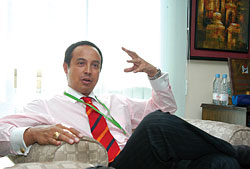
When Nabil Bank opened in 1984, it was the first foreign joint venture in Nepal's banking sector and enjoyed first player advantage. But it didn't last. Soon, there were other multinationals: Grindlays and Indosuez overtook Nabil.
|
|
| CRISPLY PUT: Nabil's CEO Anil Shah has given his bank a role that goes beyond banking to spur economic growth in the hinterland. |
Nabil had transformed the way banking was done, providing a breath of fresh air for those used to the shoddy and indifferent service at the public sector banks. But by the 1990s there were others who offered the same service.
Nabil didn't exactly go into decline, but it seemed to have lost direction. That was when the board decided to make some course corrections and one part of that effort was to induct management talent from India. Then, three years ago, it brought in Anil Shah, the man who pioneered consumer banking at Standard Chartered. It turned out to be the right decision at the right time.
Shah has gone about systematically re-inventing the Nabil brand, overhauling everything from the mission statement to giving the bank a new strategic direction in rural banking.
"We didn't want to be an also-ran," Shah said in an interview this week after Nabil was selected as the Nepali Times Company of the Month for January. "We brainstormed about what we wanted to be and everyone agreed we had to be Nepal's bank of first choice."
Indeed, 'Nepal's Bank of 1st Choice' has now become Nabil's slogan and was the product of an exercise to draft a new mission statement that involved the entire staff.
"Everyone participated in the process, so it is a vision that we all own. Our mission statement is not a destination, it is a journey," says Shah listing the bank's stakeholders: customers, shareholders, regulators, the community and staffers.
Besides being profitable and efficient, Nabil wants to be a model for transparency among Nepali banks and has tried to go beyond tokenism in its corporate social responsibility credo by sponsoring female literacy programs and a glaucoma initiative at Tilganga Hospital. Staffers, who call themselves 'Nabilians', say there is a greater sense of team spirit in company in the past three years and there is a realization that their company has a goal beyond day-to-day banking to contribute to the nation's economy and to serve the community.
Some of Shah's acronyms seem to come straight out of the formula of management gurus. For example, for staffers he has simplified corporate goals into CRISP where C is for 'corporate focussed', R is for 'result oriented', I is for 'innovations', S for 'synergy' and P for 'professional'. The team-building is showing dramatic results in the bottom line. Nabil shares have soared from Rs 815 in 2005 to Rs 4400 today. Net profits are up by 48 percent.
Nabil's management has tried to find the middle ground between the efficiency of a multinational joint venture and a Nepali bank. This hybrid formula, they hope, will position the bank to adjust to the post-2010 era from when foreign banks will be allowed in without restrictions according to a WTO membership timetable. Nabil has taken a strategic decision to target rural customers. Among the reasons is a crowded urban market, the injection of remittance money into the countryside, and the fact that the default rate is virtually zero in the districts.
Two months ago, the bank launched the first phase of its rural banking drive by opening a dozen new semi-urban branches in the districts. By next year, Nabil will have 30 branches in even more remote areas. "Of Nepal's 27 million people 20 million live in rural areas, you can't be a national bank by ignoring that," says Shah, who admits he got the inspiration from Maoist leader Pushpa Kamal Dahal who was asked by journalists after joining the peace process if he'd ever go back to the jungle. "We were never in the jungle, we were in the real Nepal," Dahal had said.
Shah says it is not enough in a country like Nepal for banks to be profitable and pay taxes. "There is a higher calling, we have to ask ourselves, are we helping make a difference. And the way we do that is by taking financial services to rural areas and make that a catalyst for economic growth and employment generation," says Shah. "In 1984, Nabil brought international banking to Kathmandu. In 2007 we took banking to rural Nepal."
Previous Company of the month:
November 2007
December 2007



